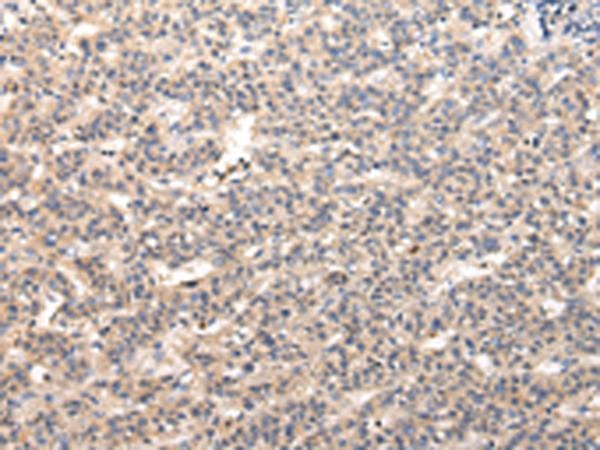


| WB | 1/500-1/2000 | Human,Mouse,Rat |
| IF | 咨询技术 | Human,Mouse,Rat |
| IHC | 1/25-1/100 | Human,Mouse,Rat |
| ICC | 技术咨询 | Human,Mouse,Rat |
| FCM | 咨询技术 | Human,Mouse,Rat |
| Elisa | 1/2000-1/5000 | Human,Mouse,Rat |
| Aliases | HCRP1; PQBP2; SPG53 |
| WB Predicted band size | 44 kDa |
| Host/Isotype | Rabbit IgG |
| Antibody Type | Primary antibody |
| Storage | Store at 4°C short term. Aliquot and store at -20°C long term. Avoid freeze/thaw cycles. |
| Species Reactivity | Human, Mouse |
| Immunogen | Fusion protein of human VPS37A |
| Formulation | Purified antibody in PBS with 0.05% sodium azide and 50% glycerol. |
+ +
以下是关于VPS37A抗体的3篇参考文献及其摘要概括:
1. **文献名称**:*"VPS37A regulates ESCRT-I complex assembly and viral budding"*
**作者**:Morita E, et al.
**摘要**:该研究通过免疫共沉淀和蛋白质组学分析,揭示了VPS37A作为ESCRT-I复合体的关键成员,在病毒颗粒释放过程中的作用。研究中使用VPS37A抗体验证了其在细胞内的表达及与其他ESCRT组分的相互作用。
2. **文献名称**:*"Structural insights into the function of VPS37A in multivesicular body formation"*
**作者**:Kostelansky MS, et al.
**摘要**:作者利用VPS37A抗体进行免疫荧光染色和Western blot,证实其在多泡体(MVB)形成中的关键作用,并发现VPS37A缺失会导致ESCRT-I复合体稳定性下降,影响细胞内运输通路。
3. **文献名称**:*"VPS37A deficiency links to impaired autophagy and cancer progression"*
**作者**:Zhang Y, et al.
**摘要**:该研究通过VPS37A抗体检测肿瘤组织中蛋白表达水平,发现VPS37A低表达与自噬功能异常及癌症转移相关,提示其作为潜在生物标志物的可能性。
以上文献均涉及VPS37A抗体的实验应用(如蛋白检测、定位分析),并探讨其在细胞机制或疾病中的功能。如需具体发表年份或期刊,可进一步补充检索。
The VPS37A antibody is a crucial tool for studying the vacuolar protein sorting-associated protein 37A (VPS37A), a component of the Endosomal Sorting Complex Required for Transport (ESCRT) system. VPS37A is part of the ESCRT-I complex, which plays a vital role in membrane remodeling processes, including multivesicular body (MVB) formation, cytokinesis, viral budding, and autophagy. The ESCRT machinery ensures proper sorting of ubiquitinated cargo proteins into intraluminal vesicles of MVBs, a process critical for lysosomal degradation or extracellular vesicle release. Dysregulation of VPS37A has been linked to cellular abnormalities, cancer progression, and neurodegenerative disorders.
The VPS37A antibody is primarily used to detect and quantify VPS37A expression in cells or tissues via techniques like Western blotting, immunofluorescence, or immunoprecipitation. Researchers employ it to investigate ESCRT-I function, membrane trafficking dynamics, and disease mechanisms. Polyclonal and monoclonal variants are available, often raised in hosts like rabbits or mice, with validation data ensuring specificity and cross-reactivity across species. Recent studies highlight its utility in exploring VPS37A’s role in exosome biogenesis, receptor downregulation, and cellular stress responses. As ESCRT-related pathways gain attention in cancer and neurodegeneration research, this antibody remains pivotal for dissecting molecular pathways and identifying therapeutic targets.
×